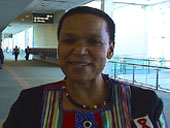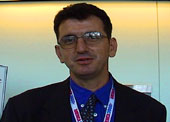


SHARING THE LESSONS OF DEMOCRACY
August 17, 2000 -- While most of the major party decisions were made long before this year's conventions, one small group of visitors insists the gatherings have furthered democracy in the world.
 |
"This is a very emotional experience to see how Democrats in the United States have brought all these people together," Manuel Tome of Mozambique said. He has joined 550 other foreign diplomats and political leaders to observe the convention and reflect on the democratic process.
"For us, it is a unique opportunity to share our feelings and experiences" as leaders in newly democratic countries, the Secretary General of Mozambique's leading party said from the Convention Center.
The program, organized by the National Democratic Institute for
International Affairs, creates an international "club of democratic
political parties and there's a real value in that," said Ken Wollack,
president of NDI.
"There is a sense of solidarity and mutual support that comes out of these events, so it's not only observing the American experience," Wollack said.
According to Wollack, despite NDI's Democratic affiliation, the
International Leaders Forum is a bipartisan program. The week has included
talks and panels with President Clinton, Secretary of State Madeleine
Albright, academics and international leaders.
 |
| Nikola Camaj, Montenegro |
"It's difficult to imagine any other country where politicians would take so much time out to talk to people with no benefit to them, only a benefit to us," Lord David Steele of Scotland said. "The conventions remind me every four years just how the American political process works, with all its flaws." This is the fifth convention he has attended with NDI.
Ambassador Sheila Sisulu of South Africa attended the Republican convention in addition to the DNC and said the enthusiasm of the delegates most impressed her. "What amazes me is, despite the differences in approach and policy and vision, the dedication to democracy, to the issue of America first and what's best for America."
How can observing a scripted convention actually help leaders who are fighting to establish uneasy democracies?
"There are some things we can take back as examples of ways to adjust our system, but we really have a very different situation in Mozambique," Tome said. "The differences are big and many."
Tome cited one obvious disparity between the two nations.
"All of this campaign is a media campaign. The majority of people
in
Mozambique cannot have a TV set, so our campaigns cannot use the media
that way. They are made of more personal contact," he said. "The
amount of money this convention takes, it's completely impossible to create
such a
convention."
Nicola Camaj of Montenegro said that perhaps his experiences at the DNC could help him set up a convention for his Democratic Alliance of Albanians. "Of course, it would be smaller," he noted with a smile. "There are just 600,000 inhabitants in my country and around 40,000 Albanians, so even if I brought all the Albanians, I couldn't have this kind of convention."